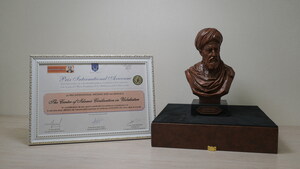Traditional Values Must Be Protected, Regional Congress at Tashkent's Center for Islamic Civilization Urges
TASHKENT, Uzbekistan, Nov. 19, 2025 /PRNewswire/ -- Scientists and historians came up with a coordinated position at a major congress dedicated to the common spiritual and educational heritage, which was held at the Center for Islamic Civilization of Uzbekistan.
Scholars and historians have expressed support for the call to defend traditional values amid growing conflicts and contradictions.
This call was made at the end of a three-day international congress in Tashkent entitled "Central Asia: A Common Spiritual and Educational Heritage – A Common Future." It brought together more than 300 participants - representatives of international organizations, the diplomatic corps, scientific and cultural institutions, as well as researchers and scientists from the countries of Central Asia and Azerbaijan.
Their support followed the opening address of the President of Uzbekistan Shavkat Mirziyoyev: "In the current extremely difficult time, when confrontations and conflicts are intensifying in different regions of the world, the most urgent task for all of us remains the preservation of peace and stability. We must learn from history, approach any matter based on knowledge and enlightenment, strengthen harmony between different peoples and expand inter-civilizational dialogue."
In a speech read out to the participants, President Mirziyoyev set the general tone for the event. Conveying the spirit of the moment, he said: "As you know, the peoples of Central Asia and Azerbaijan are connected by strong centuries-old ties of friendship and brotherhood, they are united by a common history and culture, rich spiritual and scientific heritage. Since ancient times, the greatest thinkers and scientists have lived and worked on our land, who illuminated the world with the light of knowledge and enlightenment and made a worthy contribution to the development of world civilization."
Organized by the Center for Islamic Civilization of Uzbekistan, the Ministry of Foreign Affairs and the Academy of Sciences, the congress was the first international event dedicated to urgent issues of spiritual heritage and education.
The participants discussed the historical significance of the spiritual heritage, the mutual influence of the cultures of Central Asia, the history of the region and modern interregional relations. Particular attention was paid to the contribution of countries to the preservation, study and popularization of common cultural heritage, as well as the implementation of international initiatives aimed at the development of science, education and intercultural dialogue.
The event was especially symbolic because it was held in the new Center of Islamic Civilization. The complex, which will open to the general public in March 2026, embodies the 3,000-year history of the region, the Islamic Renaissance and the modern development of New Uzbekistan. It serves as a platform for studying civilizational heritage, educating young people and strengthening international cultural dialogue.
The congress was attended by ministers of culture, representatives of academies of sciences and religious institutes, national museums and libraries, as well as heads of national film studios, academies of arts, writers' unions and youth organizations.
They studied the historical significance of the spiritual heritage and the mutual influence of the cultures of Central Asia, the history of the region, modern interregional relations, economic integration and sustainable development.
More than 10 memorandums of cooperation were signed between scientific and cultural institutions of the participating countries to conduct joint research, academic exchange and implement joint projects to study and popularize the rich spiritual and cultural heritage of the region.
In the declaration, the participants stated: "We call on states, academic institutions, international organizations and cultural actors to join efforts to protect common values, strengthen mutual understanding and create a space where knowledge and education will become the basis for peace, trust and sustainable development."
The Congress also supported the new Kelajak Merosi International Award, established by President Mirziyoyev to recognize the merits of individuals and organizations that have made a significant contribution to the study of the scientific and spiritual heritage of the peoples of Central Asia and Azerbaijan.
The President called on the international community not only to admire the past, but also to learn from it for the future. Inspired by his initiative, the participants agreed to prepare a draft special resolution of the UN General Assembly on the recognition of "the contribution of the Islamic civilization of Central Asia to the development of world education, science and culture."
The Director of the Center, Firdavs Abdukhalikov, noted:
"Central Asia is not just a region, but a space of great ideas and creation, where the traditions of science, culture and enlightenment have been formed over the centuries. Here, at the crossroads of the cultures of Central Asia and Azerbaijan, a special spiritual tradition based on the single harmony of enlightenment and faith was born hundreds of centuries ago.
We are meeting today in the heart of Tashkent – within the walls of the Center for Islamic Civilization, established at the initiative of the President of the Republic of Uzbekistan Shavkat Mirziyoyev. This center has become a symbol of respect for our common heritage, a space where the past, present and future of enlightenment meet. We have gathered here not just as representatives of different countries, but as like-minded people, united by common spiritual roots and a desire for mutual understanding.
On behalf of the head of our country, the Center is ready to actively work together with respected partners - to exchange experience, support joint research, educational and museum initiatives, implement cultural projects that reveal the rich heritage of the region in the name of studying, preserving and popularizing the cultural heritage of our countries. Only by combining efforts, we will be able to turn our common past into the basis of a common future," said the Director of the Center.
Information for editors
The Center for Islamic Civilization is located on historic territory in the heart of Tashkent, next to the spiritual core of the capital of Uzbekistan, the Hazrati Imam Mosque. The three-storey building measuring 145 by 115 meters has a central dome with a height of 65 meters. In the center of the complex is the Quran of Uthman - one of the world's oldest manuscripts of the Quran, included in the UNESCO Memory of the World Register.
The main museum area occupies about 15,000 m², and other parts of the building house a research center, restoration and digitalization laboratories, a library with more than 200,000 unique publications and offices of international organizations. Visitors will be able to see rare artifacts from different eras, acquired at the initiative of the President of Uzbekistan at international auctions and from private collections. The Center also presents collections of museums from around the world and materials of the World Society for the Preservation, Study and Promotion of the Cultural Heritage of Uzbekistan (WOSCU). Interactive exhibitions will show achievements in algebra, astronomy and medicine - some of the most important discoveries of the Golden Age of Islam.







Share this article